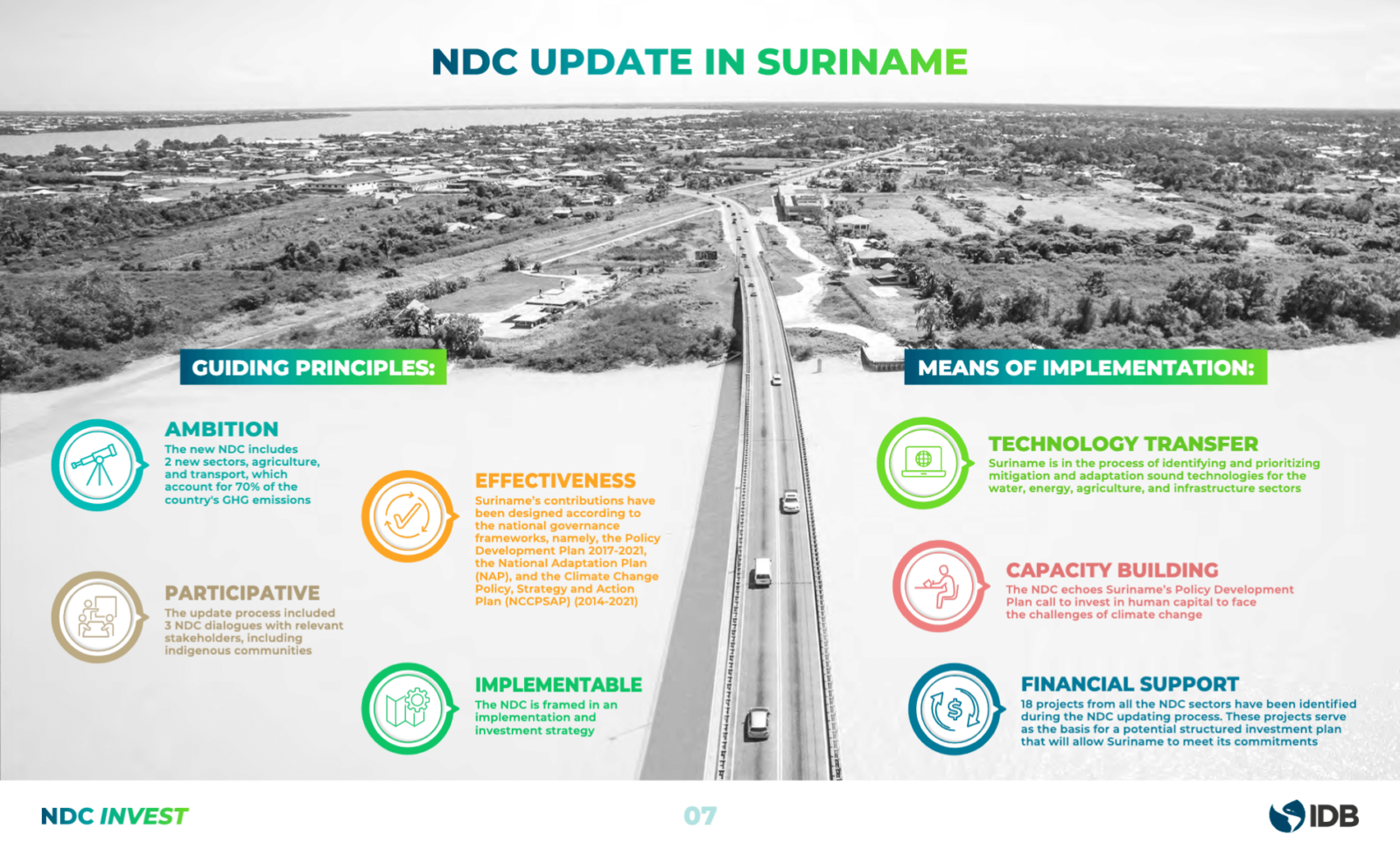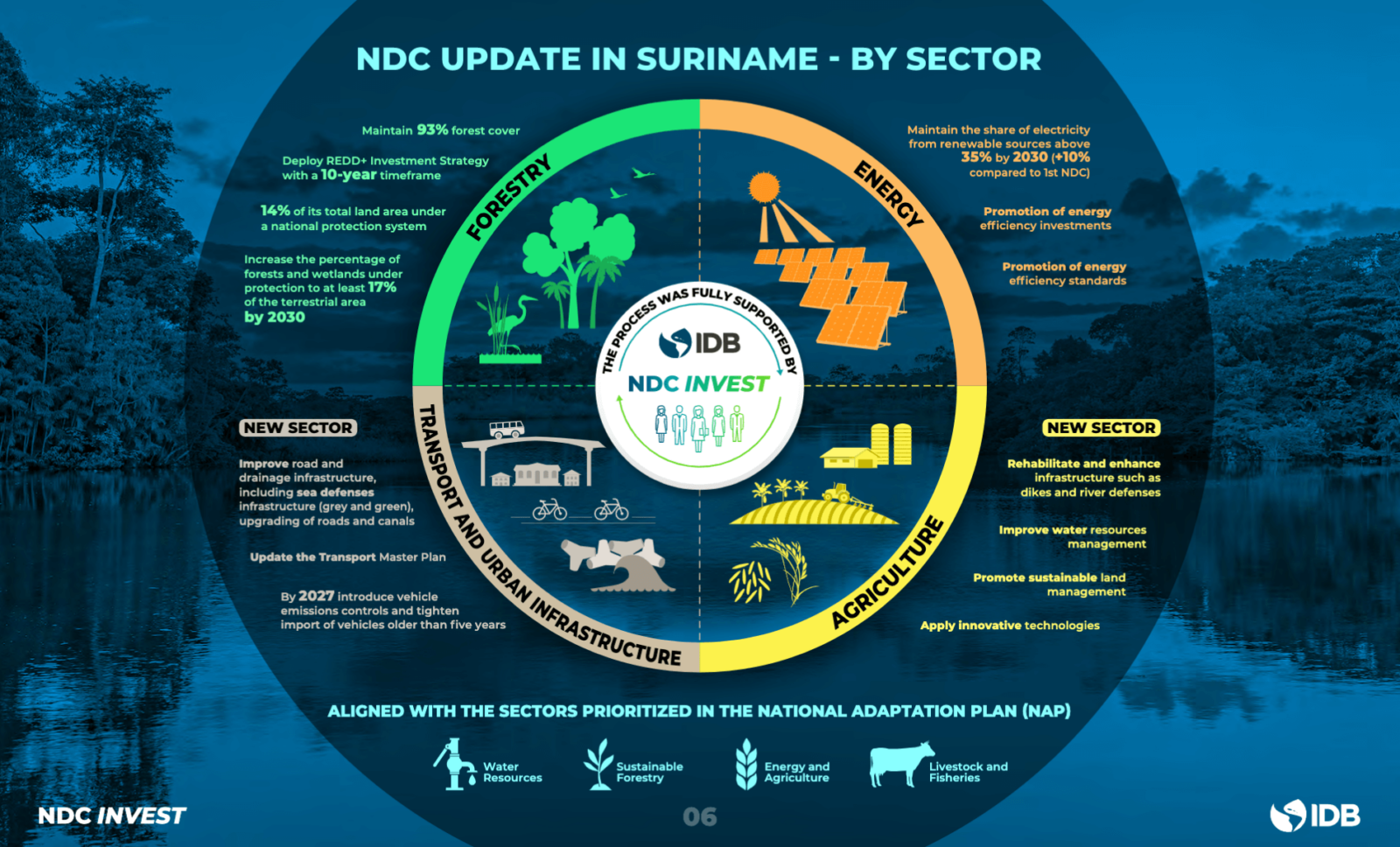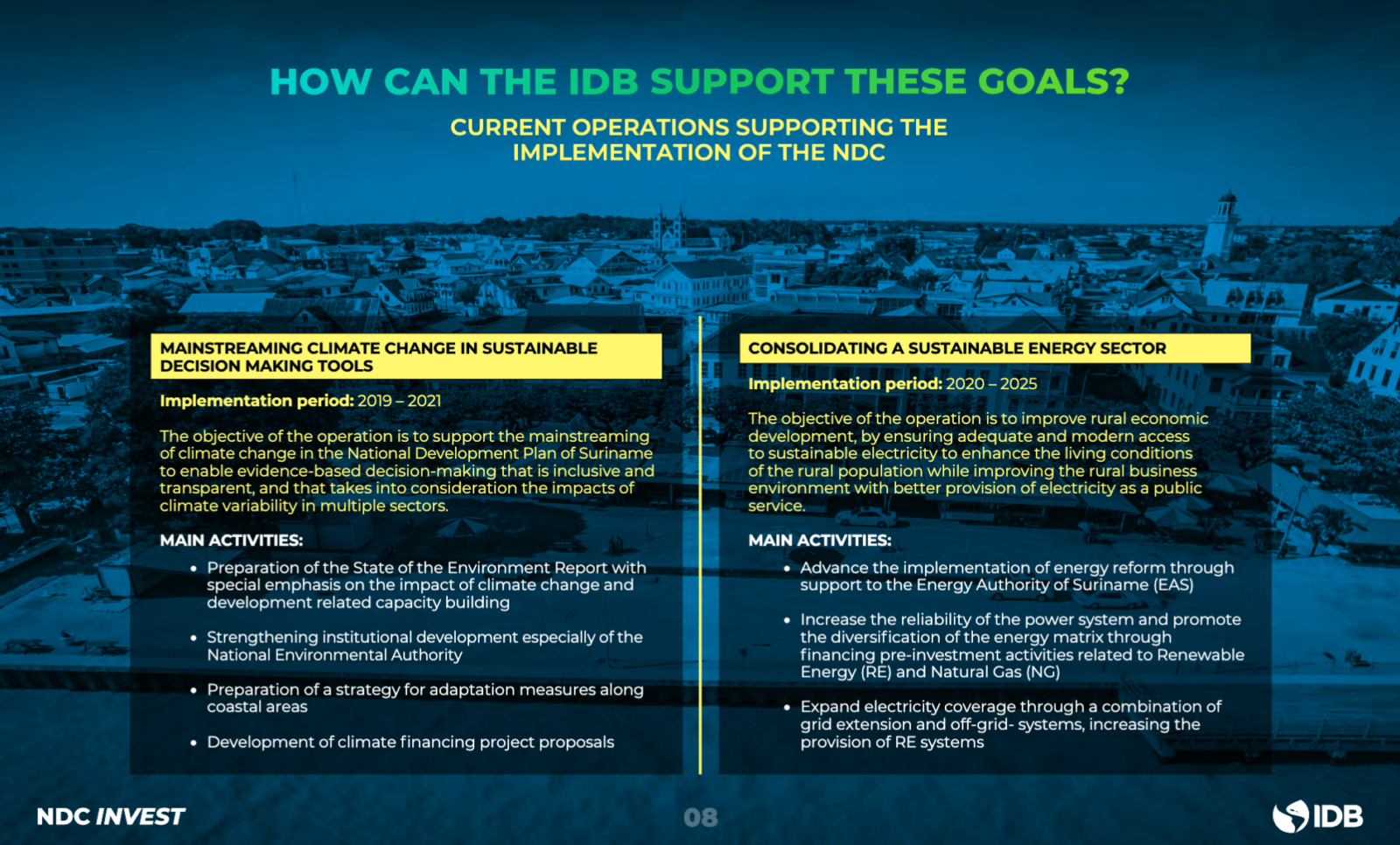This December will mark the fifth anniversary of a historic achievement for international climate action: the Paris Agreement. During the UN Climate Summit (“COP21”) in Paris, France, this milestone represented a call by the international community to increase climate ambition and achieve the transformation of current development trajectories towards net-zero emissions and climate-resilient economies.
At the heart of the Paris Agreement are the Nationally Determined Contributions (NDCs), which are the main instrument at the national level for the definition and implementation of these long-term objectives. Since 2015, countries have taken steps to update their NDCs. Many countries have made an unprecedented effort to set ambitious goals in line with national realities as part of the construction of their NDCs. Suriname was no exception.
NDC INVEST is supporting the development of NDCs in Latin America and the Caribbean
Suriname was the second country in the world to update its NDC following the Marshall Islands. With the support of the IDB’s NDC INVEST platform, Suriname developed a robust update process, guided by the principles of ambition, participation, effectiveness, and implementability.

This resulted in the development of a new NDC with approval from the different sectors involved, including indigenous communities. It is also aligned with the main climate policy and planning instruments in the country such as the Policy Development Plan (2017-2021), the National Adaptation Plan, and the Climate Change Policy (2014-2021).
It also included the agriculture and urban infrastructure/transport sectors in the new NDC, which contribute 70% of GHG emissions. The enhanced ambition was also secured from energy and forestry sectors, which were included in the first NDC.
In addition to working on the update, NDC INVEST identified a list of potential projects for the implementation of the NDC which would cost an estimated US$ 696 million. These projects seek to serve as a base for articulating a structured investment plan and informing investors and development partners who may wish to support Suriname with the implementation of these ambitious climate commitments.
Linking climate targets with sustainable recovery from the pandemic is imperative
Suriname’s updated NDC is a success story of the renewed commitment to achieving a net-zero emissions and climate-resilient future. However, in the context of the COVID-19 pandemic, it is also a guiding tool for the much-needed sustainable recovery.
The unprecedented crisis triggered by the pandemic highlighted the vulnerability and lack of resilience of economies and societies around the world. Suriname was no exception. As a consequence of the pandemic, both public finances and household incomes have been severely affected.
Suriname’s sectoral commitments included in its NDC open avenues for the creation and consolidation of new industries that could generate income for the country. These industries can be a source of green jobs in sectors such as agriculture, renewable energy, construction, and manufacturing that could help generate income for households in Suriname.

For example, the goal to generate 35% of electricity from renewable sources and promoting energy efficiency investments could help drive a completely new industry in the country that could create new green employment and strengthen the technical profile of the local workforce.
The commitment to conserve 93% of forest cover and develop forest conservation strategies could be an important catalyst to transform the production and trading of timber and non-timber products, as well as for the development of financial mechanisms for forest carbon and biodiversity conservation.
In the agricultural sector, the introduction of technologies and practices for the development of sustainable agriculture with climate criteria could help to revive and modernize a fragile economic sector and to improve food security.
Finally, using the NDC, tourism is a cross-cutting sector for economic recovery. Although the sector has been severely affected by the pandemic, the NDC could be instrumental to guide the development of the industry since it provides conditions to make the country a more attractive and safe destination to visitors by seeking to promote greater resilience and competitiveness.
The IDB is supporting Suriname’s sustainable recovery
The IDB’s response to COVID-19 and the promotion of sustainable development make it a key ally for a sustainable recovery in Suriname.
As part of our operations, we are supporting the government in translating climate change into Suriname’s National Development Plan to enable scientific evidence-based decision-making to be inclusive and transparent, and to take into account the impacts of climate variability across multiple sectors.
We are also supporting the consolidation of the energy sector through the improvement of rural economic development by ensuring adequate and modern access to sustainable electricity. Through the improved supply of electricity as a public service, it is expected that the livelihood of the rural population, as well as the business environment, could be improved.
There are also interesting possibilities for Suriname that could help foster its recovery. For example, blue carbon conservation and biodiversity provide opportunities for articulation with the private sector, particularly in the development of financial conservation mechanisms and the promotion of tourism activities. Increasing urban resilience in the historic center of the capital, Paramaribo, could be also an important catalyst for the development of the green/resilient housing and commercial sector, mitigating the already evident effects of climate change in the city (e.g., flooding).

Despite the great challenges to reactivate and diversify the economy, and to improve the livelihoods, the update of the NDC is evidence of Suriname taking the right steps. The country’s leadership in defining these new goals is expected to translate into concrete actions for sustainable and resilient recovery. Joint action with strategic allies such as the IDB will certainly be essential to achieve these greater goals.
To learn more about Suriname’s NDC, check out the full infographic here.
Other readings:
NDC Invest: Supporting NDC Development in Latin America and the Caribbean: Suriname
NDC Invest and climate ambition: How Suriname enhanced its NDC on the way to COP25
COVID-19 is our wake-up call to build a sustainable and inclusive future
Employment in the future of zero net emissions in Latin America and the Caribbean
NDC INVEST supports Latin American climate action during coronavirus
Follow us on Twitter: @BIDCambioClima
Photo credit: BID Ciudades Sostenibles – Flickr


Leave a Reply